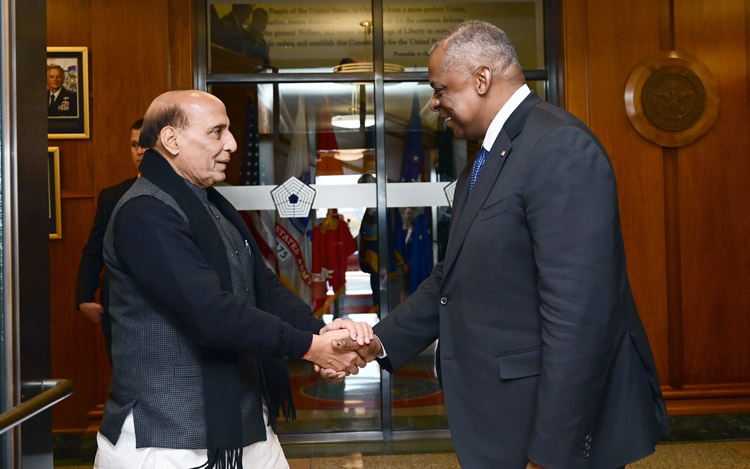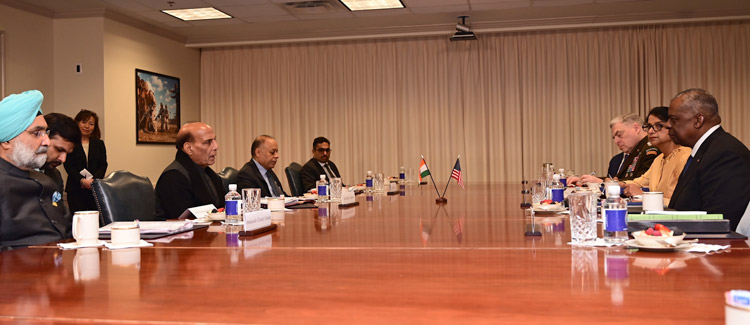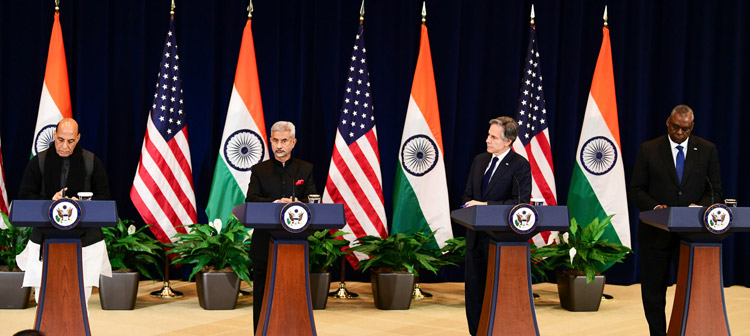INDIAN ARMED FORCES CHIEFS ON OUR RELENTLESS AND FOCUSED PUBLISHING EFFORTS

The insightful articles, inspiring narrations and analytical perspectives presented by the Editorial Team, establish an alluring connect with the reader. My compliments and best wishes to SP Guide Publications.

"Over the past 60 years, the growth of SP Guide Publications has mirrored the rising stature of Indian Navy. Its well-researched and informative magazines on Defence and Aerospace sector have served to shape an educated opinion of our military personnel, policy makers and the public alike. I wish SP's Publication team continued success, fair winds and following seas in all future endeavour!"

Since, its inception in 1964, SP Guide Publications has consistently demonstrated commitment to high-quality journalism in the aerospace and defence sectors, earning a well-deserved reputation as Asia's largest media house in this domain. I wish SP Guide Publications continued success in its pursuit of excellence.
- Prime Minister Modi Visits Punjab’s Adampur Air Base, Interacts with Airmen after Successful ‘Operation Sindoor’; Stern Message to Pakistan
- The layered Air Defence systems that worked superbly, the key element of Operation Sindoor
- Operation Sindoor | Day 2 DGMOs Briefing
- Operation Sindoor: Resolute yet Restrained
- India's Operation Sindoor Sends a Clear Message to Terror and the World – ‘ZERO TOLERANCE’
- Japan and India set forth a defence cooperation consultancy framework, talks on tank and jet engines
Fourth Indo-US 2+2 Ministerial Dialogue
The 2+2 Dialogue was broad based with in-person meetings between the respective Defence Ministers and Foreign Ministers of both countries, preceded by a virtual summit between PM Modi and President Biden
 |
The Author is Former Director General of Information Systems and A Special Forces Veteran, Indian Army |

The fourth Indo-US 2+2 Ministerial Dialogue was held in Washington DC on April 12, 2022. As a prelude to this dialogue, US President Joe Biden hosted a virtual meet with Prime Minister Narendra Modi on April 11. In addition, in-person meetings were held between Defence Minister Rajnath Singh and US Secretary of Defence Lloyd Austin, as well as between External Affairs Minister S. Jaishankar and US Secretary of State Antony Blinken. A joint press conference was held after the 2+2 dialogue and a joint statement was also issued.
During the virtual meet, which the White House organised in backdrop of the Ukraine conflict, President Biden talked of building on the Indo-US relationship and Russia’s war in Ukraine. PM Modi said that the two democracies (India and the US) can do much for the world. He said he had spoken to the Presidents of both Russia and Ukraine for cessation of hostilities. Modi denounced the civilian casualties in Ukraine particularly the killings in Bucha, calling for independent investigation. He also said India has sent humanitarian aid to Ukraine and will continue to do so.
"It's a reflection of the growing depth and scale of our defence partnership. In a decade, our defence supplies from the US rose from negligible to a cumulative amount of over $20 billion. We look forward to US companies investing in India and supporting the Make in India programme." — Rajnath Singh, Defence Minister, India
The White House press release covering the Modi-Biden virtual meet said both leaders committed to strengthen the bilateral relationship through cooperation on clean energy, technology and military cooperation, expanded economic and people-to-people ties, cooperation in ending the COVID-19 pandemic, strengthening global health security, advancing global food security, ensuring a free and open Indo-Pacific,commitment to respect sovereignty and territorial integrity of all nations, and discussed destabilising impacts of Russia’s war against Ukraine.

White House press secretary, Jen Psaki, addressing the media later said that Biden had told Modi it is not in India’s interest to increase energy import from Russia. But the video of the Modi-Biden virtual meet released by the White House, which was also watched live by the ministers participating in the dialogue later, showed no such comment by Biden. Psaki perhaps added this on her own for public consumption in the US and western audiences.
“We can take satisfaction at the extent of progress that we have made. The yardsticks to measure growing closeness tell their own story.”
— S. Jaishankar, Foreign Minister, India
At the bilateral meeting with Defence Minister Rajnath Singh, US Secretary of Defence Lloyd Austin said, “Beijing is eroding the security of the Indo-Pacific region from its construction of dual-use infrastructure along your border to its unlawful claims in the South China Sea, and we will continue to stand alongside you as you defend your sovereign interest.” He made no mention of the Chinese aggression in Eastern Ladakh during 2020.

The 2+2 Dialogue was broad based since India’s relations with Moscow appear to have been understood by the US despite constant western goading to reduce imports from Russia. Defence Minister Rajnath Singh said, "Major defence partnership is one of the most important pillars of India-US strategic relations. India has critical roles to play in Indian Ocean Region, wider Indo-Pacific following Act East and Neighbourhood First policies. India played a pre-eminent role in the region, from Tsunami in 2004 and during COVID-19. We have signed eight different defence-related agreements between our two countries in the last few years, including Space Situational Awareness Agreement for an unclassified domain which is being signed today. With reference to increased Indo-US military engagement, he said, "It's a reflection of the growing depth and scale of our defence partnership. In a decade, our defence supplies from the US rose from negligible to a cumulative amount of over $20 billion. We look forward to US companies investing in India and supporting the Make in India programme."
US must ‘actually’ treat India as an equal partner; not exert any kind of pressure directly or indirectly
EAM Jaishankar addressed the forum saying, "Our collaboration has grown well beyond this bilateral scope and now has a visible impact on global impact as well; it could be addressing the COVID-19 challenge, taking climate actions, ensuring maritime security or promoting critical technology. What India and US do together will make a difference......we can take satisfaction at the extent of progress that we have made. Whether it's our $160 billion trade account, our 2,00,000 students, our highest recorded investment levels, or our rapidly growing energy trade. The yardsticks to measure growing closeness tell their own story."

In backdrop of 75 years of Indo-US diplomatic relations, main points in the joint statement encapsulating the discussions at the Dialogue are summarised as follows:
- Reaffirmed importance of the Indo-US Comprehensive Global Strategic Partnership to international peace and security.
- Urged immediate cessation of hostilities in Ukraine.
- Reaffirmed commitment to a free and open Indo-Pacific, regional stability, rule of law and ASEAN centrality.
- Empower the QUAD for global good and tangible benefits for the region - vaccines, climate change, infrastructure, space, cyber security, and critical & emerging technologies.
- Enhance engagement of the India, Israel, the UAE, and the US forum on shared priorities like food security, clean energy, waste management, and infrastructure development - follow up to meeting of foreign ministers of these countries in October 2021.
- The US supports India’s permanent membership in a reformed UNSC and entry to the Nuclear Suppliers’ Group.
- Cooperation in cyberspace and countering the use of information communications technologies for criminal purposes.
- Expand joint-capacity building efforts with third-country partners in peacekeeping and launch a joint National Investigation Officers Training of Trainers course in partnership with the UN.
- Called on Taliban to deny Afghan territory for terrorism.
- Called for cessation of violence in Myanmar, restoration of democracy and implementation of ASEAN’s Five Point Consensus.
- America supports India’s G20 Presidency from December 2022 to November 2023.
- Decision to establish a framework to advance cooperation in CET like advanced communication technology, artificial intelligence, quantum science, STEM, semi-conductors and biotechnology.
- Cooperation in affordable deployment of clean and emerging energy technologies.
- Expand bilateral cooperation in the energy and nuclear energy sectors.
- NASA-ISRO Synthetic Aperture Radar (NISAR) satellite to be launched from India in 2023.
- Commitment to advance multi-domain comprehensive defence partnership.
- Inaugural Defence Space Dialogue and Inaugural AI Dialogue to be held during 2022.
- Called on Pakistan for immediateand irreversible action to ensure that no territory under its control is used for terrorist attacks, and bring to justice perpetrators of the 26/11 Mumbai attack and Pathankot attack.
- Called for concerted action against all terrorist groups, including groups proscribed by the UN, like al-Qaida, ISIS/Daesh, LeT, JeM and Hizbul Mujahideen.
At the joint press conference, Jaishankar pointed out those Indian imports of Russian oil are miniscule compared to that by the European Union. Blinken said that the US is monitoring human rights – an uncalled for remarklike Jen Psaki considering that America’s own worldwide human rights record is atrocious and Washington has said nothing about China’s brutal handling of the public in Shanghai under the zero-Covid policy.
Both India and US recognise the Chinese threat to the Indo-Pacific, which is reason itself for the bilateral cooperation to grow. However, the US must ‘actually’ treat India as an equal partner; not exert any kind of pressure directly or indirectly. India should also take note that America was the first country to congratulate the new regime in Pakistan and has stated it wants to revive the US-Pakistan strategic partnership.





